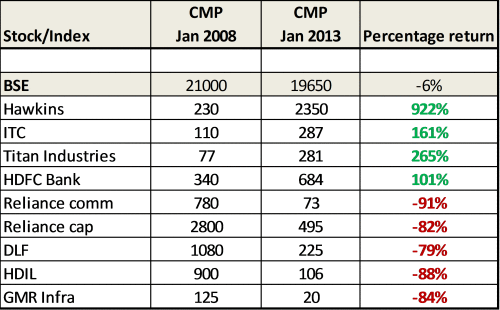Here is my answer for a black swan event-
JANUARY 1, 2013LEAVE A COMMENT(EDIT)
A Black swan event is a rare, hard to predict, low probability event-http://en.wikipedia.org/wiki/Black_swan_theory
A massive earth quake in Delhi, a major war between India and one of the neighbors, a terrorist nuclear attack in Delhi/Mumbai, a sudden significant contraction of the Indian/world economy, and a major war between any two of the top five economies in the world, are a few examples of the black swan events.
These black swan events are capable of not only killing us but also destroying our networth and leaving us unemployed. Assuming that we would not get killed in such a event, we need to understand how do we deal with them financially? Can we predict them? Can we make profit from them?
We can not predict these events, yet a black swan event may occur in our life time, and we will have to deal with it. Here is a simple strategy not only to deal with the event, but also make huge profits from it.
Let us first understand the series of events (financial) that would take place in a case of black swan event. Let us take two black swan events.
1). A massive earthquake in Delhi
- A lot of people would be unemployed, may be including you
- Real estate would crash
- People who had taken loans to buy real estate may default. Many of them would go bankrupt
- Banks would be reluctant to give loans, specially to buy real estate
- Real estate developers would also default
2). A sudden, significant contraction/recession in the Indian/world economy
- Stock market and real estate would crash
- A lot of people would be unemployed, may be including you
- Banks will be reluctant to give loans, specially to buy real estate
- Real estate developers would also default
- Both stock market and real estate would be available at cheap prices, specially stocks
- Crash in stock market likely to be a lot more than real estate
We can hedge against such events, and even make profit by following a few rules and implementing the strategy outlined below-
**Rule#1:**Never leverage more than yournet-worthto buy either stocks or real estate. For example, if your current networth is 50 lakhs, do not take a loan of 60 lakhs to invest in a flat in Gurgaon.
**Rule#2:**Always have 20% of your total networth in gold/cash/international currency etc. You should always keep 20% of your networth in safe heavens. Even a bank deposit may not be a safe heaven in case of a black swan event. Gold may crash. Rupee may lose itas value. Only way is to keep a mix of gold, cash, international currencies like dollars, swiss francs etc. This money should be separate from your investment portfolio, or anyfinancialgoal like marriage etc.
Assume you have followed the rules above, what would you do in case of a black swan event.
**Strategy:**Wait and watch the black swan event to completely unfold and impact the markets. As the stock market starts crashing, some investors still buy hoping to average out. The price keeps falling for a long period of time. Eventually, the investors stop averaging, and the market comes to a stand still. Let the asset prices touch the bottom. You can identify the bottom of any asset by very low volumes, and complete dis-interest in the asset (Stage-1 of an asset cycle-http://goo.gl/oEujd). Once you feel the bottom has reached, invest half of the funds in the stocks/asset. Wait for some time, as you may have missed the bottom. If the prices remain stagnant for some more time, with low volumes, invest the other half of funds as well.
You can apply the same strategy to real estate.
**Outcome:**Once the world around you starts normalizing, the asset value will start moving up. You need to hold your assets (stocks/real estate) at this stage (Stage 2 of an asset cycle). Wait for the environment to be completely normal, and for asset prices to shoot up before you sell them to make huge profits. (Stage-3)
Happy Investing!

